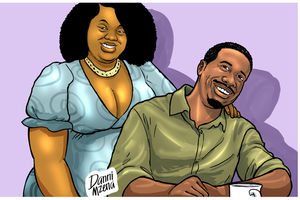Prime
Samia rallies strategic unity to unlock Africa’s potential

President Samia Suluhu Hassan speaks during the 2023 edition of the Africa Investment Forum (AIF) in Marrakech, Morocco yesterday. With her are the President of the Union of Comros, Azali Assoumani (left) and Rwanda Prime Minister, Dr Edouard Ngirente. PHOTO | STATE HOUSE
What you need to know:
- Leaders attending the 2023 edition of the Africa Investment Forum (AIF) are calling for more strategic integrations and partnerships to unlock the continent’s potential
Marrakech. Connectivity shortfalls, coupled with underdeveloped infrastructure, are among key factors that hold back Africa’s value chains, a meeting of leaders heard here yesterday.
Leaders attending the 2023 edition of the Africa Investment Forum (AIF) are calling for more strategic integrations and partnerships to unlock the continent’s potential.
They also emphasised the need for private sector investment, saying state budgets alone cannot cover all the in-vestment needed, especially in high-potential, job-intensive sectors.
Themed “Unlocking Africa’s Value Chains”, the thee-day event, which started yesterday, brings together heads of state, decision makers, multinationals, and investors.
President Samia Suluhu Hassan, who was one of the leaders in attendance yesterday, said there was a huge gap in connectivity in Africa, making the continent unable to reach its potential to contribute to the global value chain.
With that knowledge, she said, the Tanzanian government has been focusing on attracting significant investment to its infrastructure and boosting connectivity with its neighbours.
“Hail to the strategic geographic position the government has been implementing and improving infrastructure to connect the country with its eight neighbouring countries. We have invested a lot in connecting Tanzania and our eight road-accessible countries like Zambia, Kenya, Mozambique, Malawi, and the rest,” she said.
The President also mentioned the existence of strategies for investments in water, air, and railway transport to move goods and people.
“The key three things that have been working for Tanzania and can be a lesson to others on the continent will be investment in infrastructure, human capital, and the preservation of peace and security in the country,” said President Hassan.
Sierra Leone President Julius Maada Bio echoed President Hassan’s remarks, saying that the region has a serious infrastructure deficit that not only hinders movement but also holds back economic transformation.
“Some of these deficits are so serious that they are bottlenecks to everything that we should be doing to trans-form our economies,” he said. He said the region needs to devise strategies to work together with international financial institutions and private
“Another key issue is that our economies are not properly diversified. We depend most on commodities, which are subject to global price fluctuations,” said President Bio, emphasising the need to create resilient economies and reduce dependence.
He said: “We must make every effort to add value to the products that we produce...and harness the demo-graphic dividend, or youth empowerment, by investing in the youth and providing jobs for them.”
Rwanda Prime Minister, Edouard Ngirente said that through working together and building together, the continent also needs to de-risk the risk sector, including agriculture, in order to strengthen the value chains.
“The connectivity is very important because it will also ensure the movement of people. This is very important in transferring knowledge and expertise,” he said.
Emphasising strategic partnerships, the Rwandan PM said Africa needs to speak in the same voice as a continent and plan and facilitate investment strategically together.
The President of the Union of Comoros, Azali Assoumani, who is also the chairman of the African Union, said the African continent must turn those untapped opportunities into bankable projects if it wants to transform its economy.
During his opening remarks, the President of the African Development Bank Group, Dr Akinwumi Adesina, said the event came at a time of heightened geopolitical tensions and conflicts around the world, which have led to greater uncertainties and could weaken global economic growth.
“Yet, in the midst of the challenges, Africa is growing well and showing resilience. African economies witnessed a real GDP growth of 3.8 percent in 2022, higher than the world average of 3.5 percent.”
“African economies provide some of the best investment opportunities in the world. Do not believe me for my optimism; believe the data,” he said.
The African Development Bank Group organised the gathering.





